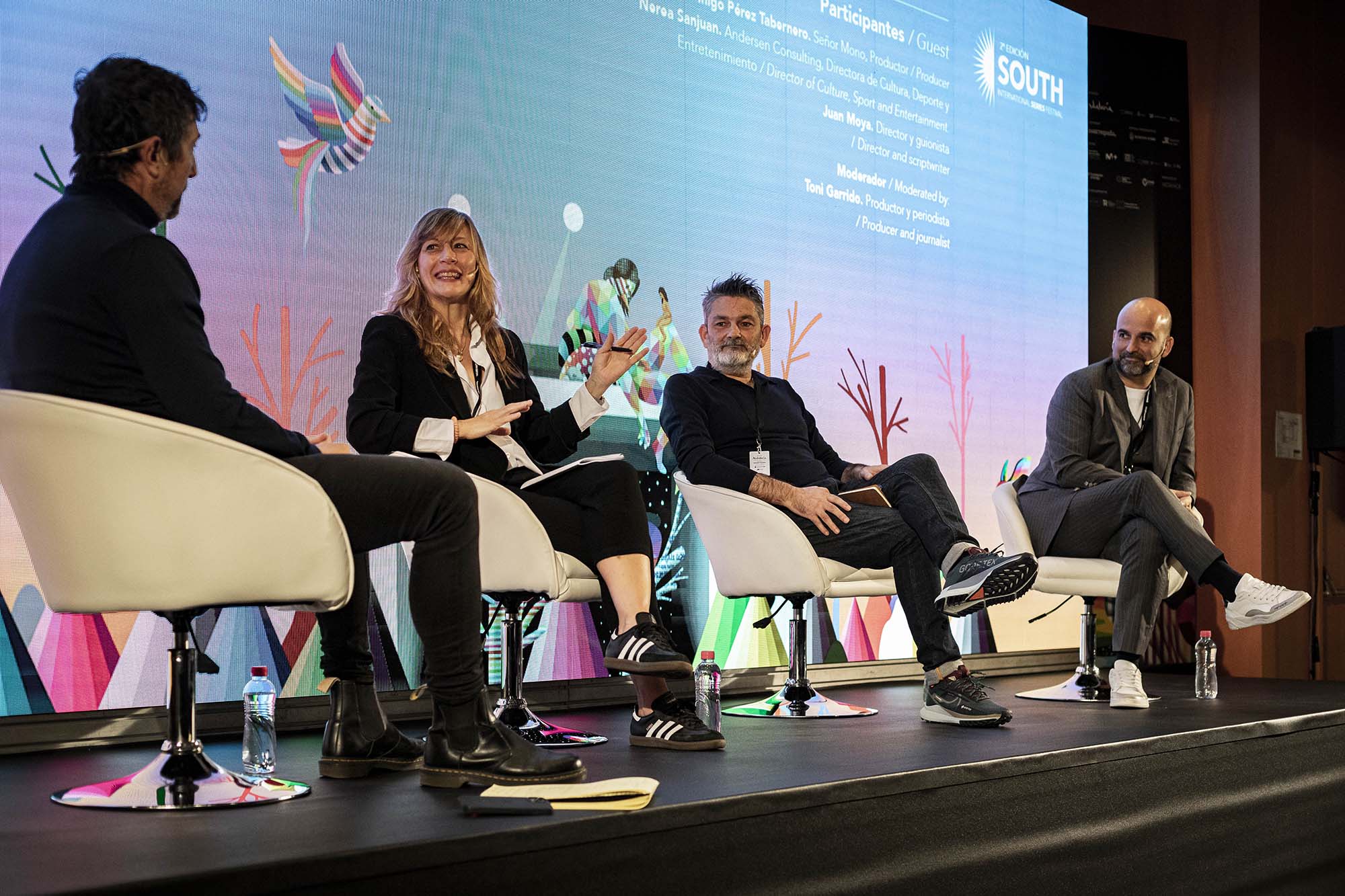The second day of South Industries featured talks on true crime, artificial intelligence in the creative process and heritage in productions.

The second day of the forum for creators of series in Spanish, a collaboration of South and DAMA (Derechos de autor de Medios Audiovisuales) was attended by screenwriter Julio Rojas, in charge of presenting the interests of the Chilean audiovisual market and screenwriter Néstor Hernández, with the standards in the U.S. and Spanish industry, with the conclusions of Joan Álvarez, director of South and Virginia Yagüe. One of the main conclusions?
“Screenwriters need to have flexible projects that can adapt to the needs and demands that are requested.”
** Industria South ha continuado con una Industry Talk en la que se ha debatido sobre los límites del true crime, una serie de reflexiones con productores, creadores y expertos en legislación acerca de los límites legales y morales en la confección de series basadas en crímenes reales. La charla ha tenido lugar con el productor Iñigo Pérez; Nerea Sanjuan, directora de cultura, deporte y entretenimiento Andersen Consulting; Juan Moya, director y guionista y moderación de Toni Garrido, productor y periodista. Una de las preguntas claves planteadas y algunas respuestas: ¿Cuánto tiempo debe pasar para contar una historia basada en un true crime?
“Time gives a general overview, when you are in the day-to-day the media avalanche can lose you, only by seeing it over time can you appreciate it.”
“Doing true crime is all very well but you must have analytical skills.”
“Victims and related persons must be perfectly protected; public persons or persons with greater projection have less protection.”
** La inteligencia artificial como herramienta en el proceso creativo de la industria audiovisual ha sido el título de otras de las Industry Talk, con Clara Ruipérez de Azcárate, Iban García del Blanco, directora de estrategia jurídica de contenidos Telefónica; el jurista Iban García del Blanco; Carmen Páez Soria, subsecretaría de Cultura, Ministerio de Cultura de España; el guionista Beto Marini y moderación de Eduardo Fernández Palomares, consejero de Cultura y representación Permanente de España ante la UE. ** La Industry Talk Orden en el caos: cómo transformar el patrimonio en el set de una superproducción, ha contado con Pilica Querol, directora de Andalucía Film Commission; la directora de arte Vanesa de la Haza; el localizador Juan Antonio Clemente, con la moderación de Alejandro Ávila. Esta charla se ha centrado en las producciones cinematográficas que ruedan en localizaciones con protección oficial. En resumen, se ha puesto sobre la mesa los muchos permisos y burocracia que hay que solicitar a diferentes administraciones, así como incluir el programa de dirección artística para comprobar que el patrimonio no va a ser alterado. ** La tarde ha comenzado con la Industry Talk del sindicato de guionistas, con los desafíos globales a los que se enfrentan los sindicatos de Estados Unidos y Europa, bajo la temática: Desafíos comunes ¿soluciones distintas?, con la presencia de Travis Donnelly, Carolin Otto y Willard Tressel. ** Elena Neira fue elegida como una de las 50 mujeres más influyentes del negocio audiovisual español según la revista Forbes y Gloria Saló es directora de mercados internacionales y comunicación y directora de contenidos, han estado hablando sobre el futuro de la ficción en Europa. Aquí algunas claves:
“We come from a time when platforms started with only original production and now there is more traffic and activation of intermediaries.”
“The future of platforms is to go back to the origins with all kinds of content, including entertainment and docuseries.”
“Platforms are big containers where everything fits.”
** Para rematar la segunda jornada ha tenido lugar el afterwork conversations, con El papel de la música y los profesionales musicales en la industria audiovisual, con la presencia de Giuseppe di Bella, IP & Music Counsel en Netflix; Juanto Tello, supervisor musical, Isabel Royán, compositora y Jacobo Alvarez, License & Sync Manager, con moderación de Lucía Sánchez e Iban Díez, socios fundadores de MENTA Legal. Algunos aprendizajes fundamentales de esta charla han sido…
“The role of the music supervisor is key to work with the direction of the film, he is the one who helps with the creative part at the musical level but also knows all the rights: he optimizes the musical part and adjusts the budget.”
“Copyright owners may agree to the use of a music depending on the accompanying images.”
“Composers are not just musicians, they also come up with creative ideas and help establish the essence of a film.”
“It’s important to take music into account, whether or not it’s the main character of the film. There are films that can be greatly enhanced thanks to it”.
“The most important music libraries have many types of music except flamenco.”
“We’re going back to the trend of the ’90s’, of telling a lot with songs.”
South International Series Festival is a private initiative, co-financed by the Feder Andalucía 2021-2027 Program and the Junta de Andalucía, with the City Council of Cádiz and the Diputación de Cádiz as official entities. It also counts with the participation of Mediaset España as media sponsor; Movistar Plus+, Port Authority of the Bay of Cadiz and Spain Film Commission, Unicaja Foundation, Andalucía Film Commission and Rims Mobility as sponsor; and with the collaboration of Canal Sur Radio and Television, Iberia and Cultura Inquieta, with the financing of CREA SGR , and with Renfe as Official Train.



